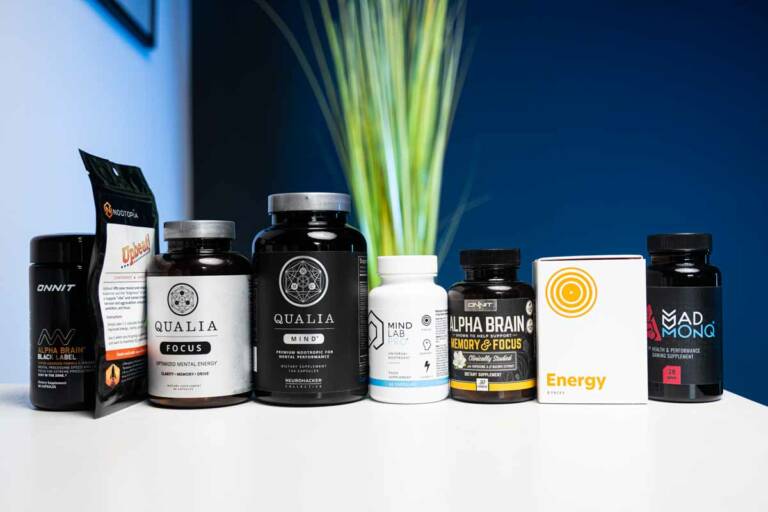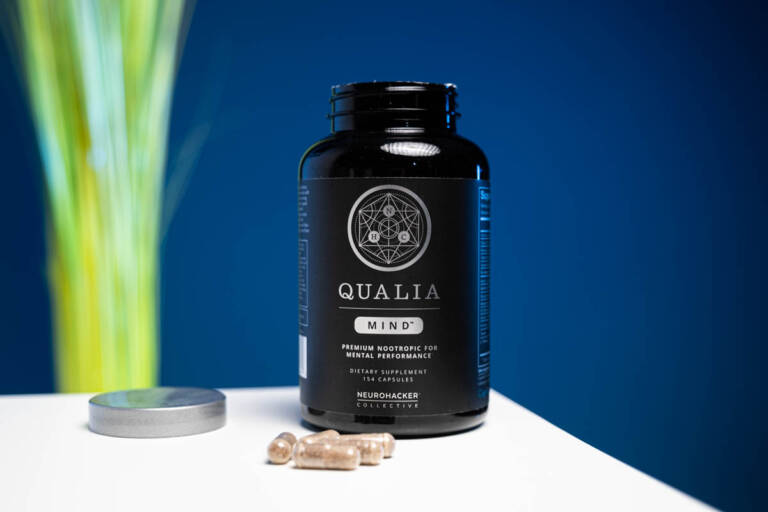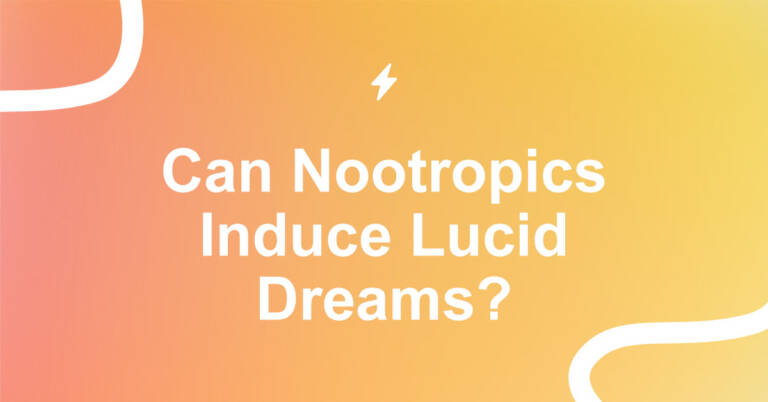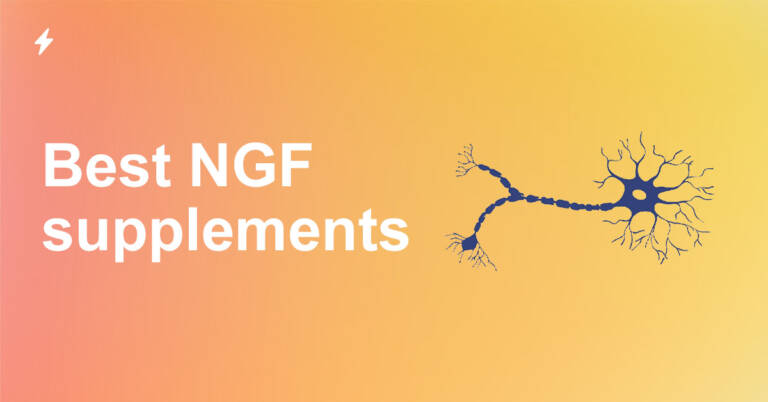Happiness. It’s something we all want but is it possible to reach a state of true happiness with the help of euphoric nootropics? As a nootropic fan, you know that you can improve cognitive performance, boost mood and enhance critical thinking skills through nootropic foods or supplements.
While happiness is something we all want, euphoria isn’t always positive or rooted in reality.
If you’re wondering whether there are natural supplements that can induce euphoria, the answer is yes! To find out more about this and learn what euphoria is, continue reading!

What Is Euphoria?
There are many ways to define euphoria including a “pleasant excitement” and “the sense of ease and well-being.” Euphoria is a way your brain responds to pleasure.
Being in a euphoric state means feeling intense pleasure, limitless joy, and excitement. Consider the feeling of winning something or being on a roller coaster ride.
Euphoria is caused by chemical reactions in the brain and many neurotransmitters and receptors are involved in inducing this feeling of extreme pleasure.
In addition to natural “highs” such as the one we’ve mentioned above, there are also drugs that stimulate the state of euphoria. These include the following:
Adderall
Amphetamine
Cocaine
MDMA
Ritalin
Drugs used for anesthesia such as ketamine can also cause euphoric sensations. While it’s often associated with intense pleasure, euphoria can also be negative.
For example, the euphoria that doesn’t reflect a person’s reality is a symptom of some neurological or neuropsychiatric disorders such as mania. [*]
Whether natural or drug-induced, feeling euphoric is something that anyone can attain. Continue reading to learn more about what triggers euphoria and natural and over-the-counter euphoric supplements you can enjoy!
Euphoric Triggers
Even if you don’t necessarily see them as euphoric, you’re familiar with many euphoric triggers. For example, many natural rewards and social activities can induce euphoria. These include:
Laughter
Dancing
Listening to music
Religious or spiritual rituals
Love
Sex
Food
Intense physical exercise like aerobic exercise and long-distance running are also examples of euphoric triggers. For instance, long-distance runners experience what’s known as “runner’s high,” a deeply relaxing state of euphoria. [*]
While these are all-natural “highs,” some people search for ways – legally or otherwise – to experience a euphoric state. But here’s the thing: whether through a natural reward or an illegal drug, euphoria can be addictive.
This is because we seek the feeling or sensation associated with an activity and when pleasure kicks in, we try our best to experience that feeling again. Even if the activity was harmful to us.
Euphoria And Your Brain
Whether someone’s euphoric mood is a result of exercising, love, listening to music, taking euphoric supplements, or illegal drugs, the brain’s response system is often the same.
For example, different brain chemicals can have a euphoric effect. These include chemicals such as the following feel-good hormones and neurotransmitters:
Endorphins
Adrenaline
Dopamine
Serotonin
So how does someone get euphoric? According to neuroscientists like Kent Berridge, euphoria is the result of the brain’s activation of hedonistic hotspots that are located in the brain’s reward circuit. [*]
The medial shell is one of these hotspots that operates from a sub-region of the nucleus accumbens within the limbic system.
The nucleus accumbens is part of the brain that’s involved in functions such as reward, positive behavioral reinforcement, and motivation.
It signals another hotspot near the base of the forebrain called the ventral pallidum. [*]
Also known as the brain’s reward system, our brain’s reward circuit is made up of a group of neural structures. These structures are activated whenever we do something rewarding.
Taking addictive drugs, eating a delicious meal, and bungee jumping are examples of things that activate this response. As a result of this, the brain releases dopamine to brain regions along specific pathways.
It’s believed that getting a complete sensation of euphoria requires simultaneous activation of every single hedonistic hotspot within the brain. [*]
The Role Of Dopamine In Euphoria
Known as the “pleasure neurotransmitter,” dopamine is a chemical that responds to a range of pleasurable events and experiences.
Since the brain’s response to pleasure involves releasing dopamine, the structures that are associated with the brain reward system are located along the major dopamine pathways in the brain. [*]
Euphoria is associated with the mesolimbic dopamine pathway that connects the ventral tegmental area (VTA) with the nucleus accumbens.
VTA is a small cluster of neurons in the brain that’s important for regulating our body’s reward system. While the nucleus accumbens is a key brain area believed to mediate different behaviors including motivation and reward. [*]
Dopamine neurons in the VTA are activated during euphoria. These travel down the mesolimbic dopamine pathway, which in the process boosts dopamine levels in the nucleus accumbens. [*]
Another major pathway in the reward system is the mesocortical pathway. Like the mesolimbic pathway, the dopaminergic projections within the mesocortical pathway also originate in the VTA.
This pathway begins in the VTA and travels to the frontal lobes in the cerebral cortex. This is an area in the brain that’s highly involved in working memory, decision-making, and cognition. [*]
Dopamine Is Not Only About Euphoria
As the “pleasure neurotransmitter,” it’s easy for us to assume that dopamine is all about inducing pleasure and positive feelings. But there’s more to dopamine than its reward aspect.
This is because dopamine neurons are activated even before we receive an actual reward. The neurons signal to us information about unexpected events, which means that the role of dopamine isn’t about triggering euphoria but about connecting behavior with pleasure.
This is why, for example, if a reward is fully expected, dopamine neurons don’t respond to it. [*]
Euphoria And Decision-Making
One important thing to note about euphoria is how it can impact our decision-making abilities. In the quest for “permanent” pleasure, many seek it in the wrong places.
Drug misuse and addiction can cause a huge increase in dopamine in the brain. Though this satisfies a person’s natural reward system, repeated use raises the threshold for this pleasure.
This pleasure motivates a person to take more to have a similar effect. In the end, this turns into a vicious cycle of seeking a “high” that’s difficult to experience. [*]
That’s not all. Taking drugs prevents your body from naturally producing dopamine, which is why feeling low is common when a person is sober. We won’t even mention the withdrawal symptoms!
Poor decision-making can lead to risky behavior and eventually, addiction to dangerous drugs. But it’s not only illegal drugs that create a risky relationship with euphoria.
Conditions like obesity show us that highly processed and junk foods, though not illegal, can lead to addiction and/or self-harm. Thankfully, there are safe ways to feel euphoric – as long as we maintain a healthy balance.
Euphoric Supplements
There’s no doubt that euphoria has beneficial effects and promotes mental well-being. After all, dopamine isn’t only responsible for feelings of pleasure and euphoria.
Our cognitive function, brain energy, and mental performance all benefit from this important chemical.
Beyond food and other known euphoric triggers, there are also natural supplements that can make you feel euphoric and good. If boosting dopamine levels is on your radar, you’ll love these supplements.
As a side note, keep in mind that for a nootropic to elicit euphoria, it needs to interact with dopamine in one way or another.
L-Theanine
L-Theanine is an amino acid that’s found in Camellia Sinensis – what we know as green tea leaves. This non-dietary compound is also found in black tea and some mushrooms.
Because of its ability to reach the brain quickly after consumption, L-Theanine is known for impacting nerve impulses in the brain and releasing neurotransmitters such as GABA.
This relaxing neurotransmitter has calming and anti-anxiety effects. [*] If you’ve had green tea before, you know that it has calming effects whilst improving alertness.
This amino acid also increases the levels of other important neurotransmitters including dopamine and serotonin. [*]
L-Theanine has been shown to reduce stress. [*] This compound also increases alpha brainwaves (α-waves), which are associated with relaxation and attention. [*]
Thanks to its ability to increase blood flow, L-Theanine is also known for protecting our brain. It prevents the death of brain cells and protects the brain against environmental neurotoxins that are linked to Parkinson’s disease. [*]
All these beneficial effects of L-Theanine make it a great nootropic that can boost our mood.
Rhodiola Rosea
Known as the “golden root,” Rhodiola Rosea is an adaptogenic herb with powerful brain-boosting and energy-enhancing properties.
This remarkable herb contains more than 40 different chemical compounds, which explains why it has different benefits for overall health. [*]
One of its most powerful bioactive components, salidroside, has been proven to have the following properties: [*]
Antifatigue
Antidepressant
Antioxidant
Anticancer
Anti-inflammatory
Let’s take a quick look at the health benefits of Rhodiola for the brain.
In one study, physicians working night shifts were either given 170 mg of Rhodiola daily for two weeks or a placebo.
Compared to the placebo group, the physicians who took Rhodiola improved work performance by 20% and had reduced mental fatigue. [*]
Rhodiola was also shown to increase the sensitivity of the cells of the brain and nervous system, including dopamine and serotonin.
As we’ve previously mentioned, these are important neurotransmitters that help increase pleasure, focus, memory, and overall mood.
As a powerful nootropic, Rhodiola makes you sharper and improves cognitive performance. That’s not all.
Evidence also shows that salidroside, the potent bioactive compound in Rhodiola, can help protect your brain from oxidative damage.
This is important for protecting your brain against diseases such as Alzheimer’s and Parkinson’s. [*]
Rhodiola can also help decrease the effects of depression and help those with major depressive disorder. [*]
Natural euphoric supplements such as Qualia Mind contain Rhodiola.
Citicoline
Found in all the best nootropic stacks on the market, Citicoline is an essential nutrient that’s naturally found in the body. It positively affects mood by stimulating the release of dopamine. [*]
This essential nutrient also helps repair damaged nerve cells and protects the nerve cells in the brain from damage. [*] Citicoline is found to improve learning, memory, and overall cognitive function.
Citicoline supports processing speed, attention, and overall cognitive health. [*] For those having difficulties overcoming addiction, Citicoline is a great option as it can help overcome addiction.
If you’re looking for something to safely spike dopamine levels and facilitate euphoria, then Citicoline is for you.
Note: Make sure that you don’t take supplements on an empty stomach!
Verdict
Whether it’s a piece of delicious chocolate that melts in your mouth, taking part in a marathon, or consuming an illegal drug, the brain’s reward system activates the “pleasure neurotransmitter”, dopamine.
This sensation makes us feel incredibly good – euphoric – for part or during the whole duration of the experience. Many of us crave this feeling and want to repeat it over and over again.
Interestingly, to experience a rewarding sensation again, the mesolimbic dopamine pathway encourages us to repeat rewarding behaviors.
But what happens when we crave something harmful to us?
The thing is, the same neural pathways that are involved in inducing feelings of euphoria can also create risky behavior. This is why some people become addicted to harmful substances or experiences.
Feeling euphoric is all about finding the right balance in the mood spectrum. The good news is that dietary supplements can help. Mood-regulating natural euphoric supplements can help balance extreme emotional highs.
But don’t forget – supplements that can make you feel euphoric and good are also great for your overall well-being. From improving memory and supporting heart health to boosting cognitive performance, these supplements are multi-tasking.






